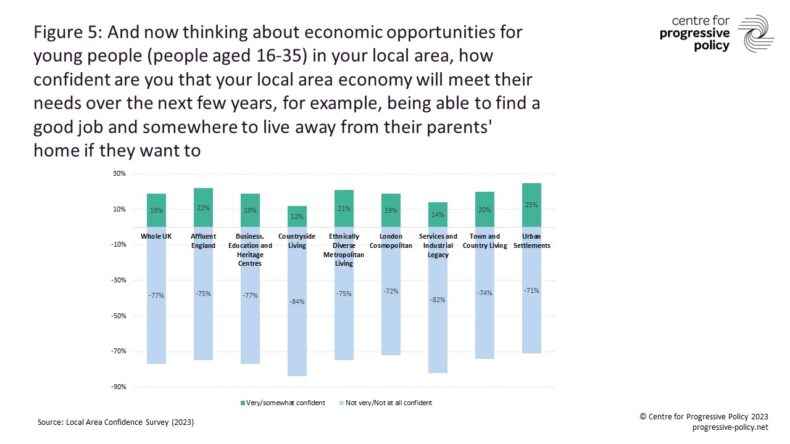Ahead of tomorrow’s Autumn statement, the Government is briefing that they have more ‘fiscal headroom’ than expected, indicating that they may bow to pressure from backbenchers and election strategists for retail tax cuts.
The idea that tax cuts are the key to winning votes in the Blue Wall is based on assumptions about the traditional, home-owning Conservative base, but new research by the Centre for Progressive Policy (CPP) suggests that some of these assumptions may no longer hold true.
CPP’s Local Economy Tracker asks a representative sample of people for their views on the overall level of economic opportunity in their immediate local area as well as how evenly spread opportunity is where they live. Across Britain, people are feeling pessimistic about the future, suggesting intergenerational inequality could be just as big a concern and the current cost of living crisis.
We asked respondents how confident they were that young people would be able to find ‘a good job and somewhere to live away from their parents if they wanted to’. The results were overwhelmingly negative. Across the UK, 77% of respondents were not very, or not at all confident that their local economy could offer this.
In every part of the UK, people do not believe their local economy can provide for young people. Voters in every type of area, from those characterised by the ONS as ‘Service and Industrial Legacy’, to ‘Affluent England’, feel their area cannot enable someone between the ages of 16 to 35 to enter the labour market, find a good job and live away from their parents.
Affluent England
The only ONS ‘supergroup’ area out of eight where respondents felt that most people have good economic opportunities is ‘Affluent England’. This group is characterised by the rural-urban commuter belt in the wealthy counties surrounding London and affluent rural areas; in other words, the Tory core vote. When asked if most people had good economic opportunities, the proportion of people in Affluent England saying everyone or most people had good economic opportunities was 17 percentage points higher than those saying the opposite, making this the only type of place in the UK where most people expect to be able to get ahead.
But even those in Affluent England are far more pessimistic about opportunities for young people. Three quarters of respondents in Affluent England are not confident that young people in their local area could get a good job and a place to live away from their parents.
This presents a fundamental challenge to some core assumptions in British politics. Inequalities between regions can allow politicians to cater to just certain parts of the country, but inequalities between generations matter everywhere.
What has gone wrong?
We also asked respondents to select two or three policies that they thought could make a positive impact on their local economy. It is unsurprising that the preferred option by far was more affordable housing (52%), followed by improved job opportunities (44%) and better wages for workers (28%).
The housing crisis is a major drag on opportunities for young people and on the wider economy. As my colleague Annabel Smith has written about, the UK has one of the highest proportions of renters (23%) among developed countries who spend more than 40% of their income on housing costs. These costs prevent households from spending on other essential and non-essential goods, which has a knock-on effect on growth. High rents and housing insecurity make life more miserable and limits wider participation in the economy.
Among respondents aged 25 to 35, one fifth highlighted childcare access as a key issue. CPP analysis published in March 2023 found that almost one million mums had been prevented from taking higher paying work as a result of insufficient childcare. In our report Funding Fair Growth, CPP advocates expanding the current 30 hours free childcare offer and properly funding the childcare sector. This would help young people starting families to pursue good work and improve their economic opportunities.

.
What should the Government do?
What our results show is that regardless of conventional assumptions about what Conservative core voters want, policies aimed at improving opportunities for the young are critically important in every part of the country, including Affluent England. Ahead of an election year, the government should be trying to prove to voters that they understand their fears about opportunities for young people and that they are acting to fix this.
Ultimately, the government needs to offer young people greater hope. Using up fiscal headroom with retail tax cuts will not do this. Addressing the housing crisis and delivering a further reaching childcare guarantee would go some way to in showing that the government gets this. It must set out a plan to invest in a more inclusive economy which offers better opportunities for everyone, everywhere and at every age.
Click here to subscribe to our daily briefing – the best pieces from CapX and across the web.
CapX depends on the generosity of its readers. If you value what we do, please consider making a donation.


